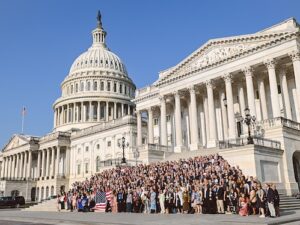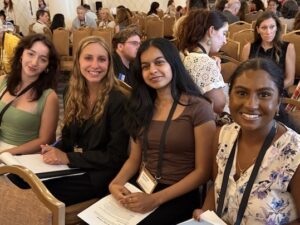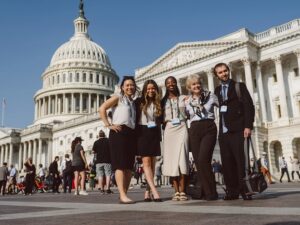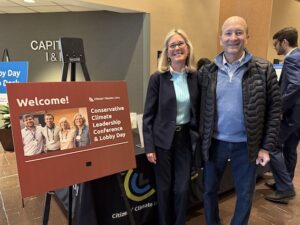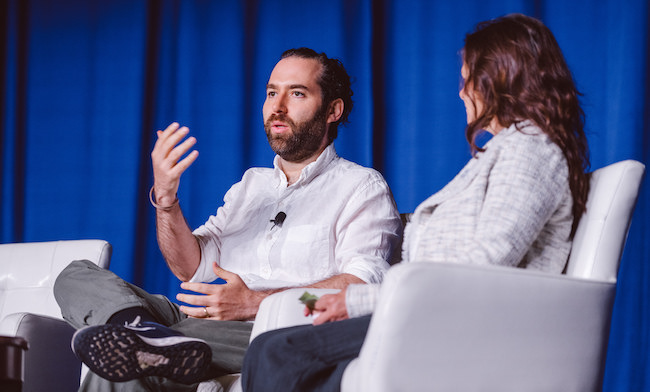
Filmmaker Ben Stillerman speaks to CCL Senior Director of Programs Elli Sparks at our 2024 Summer Conference
Connecting about climate change with the most skeptical people in the USA
By Kate Derbas
At CCL, we know that a vital part of our work is finding common ground with fellow Americans who might not think like we do about climate change.
It’s easy to make sweeping assumptions about why folks deny climate change without taking the time to delve into the reasons and context that led to those beliefs.
Determined to dig a little deeper, climate-concerned filmmaker Ben Stillerman traveled to Utah’s climate-skeptical Emery County to interview rural Utahns and understand their hesitancy to accept global warming.
With only 30% of Emery residents believing that human activity has an effect on the environment, the coal-producing county was ranked with the lowest belief in climate change in the U.S., according to 2019 research from the Yale Program on Climate Communication.
Determined to evoke curiosity, empathy, and dignity as he explored opinions vastly different from his own, Ben spent over three months in Emery, building trust with its residents. He recorded 200 hours of footage and interviewed more than 60 people, documenting their perspectives, passions, and daily life for his series True False Hot Cold.
Speaking at CCL’s Summer Conference in Washington, D.C., earlier this year, Ben shared his approach to deep listening and building trust across political divides. Watch the discussion here or read on for a recap.
Building trust
When Ben — originally from South Africa and now living in California — embarked on his quest to ask Utahns to share their perspectives on climate, he knew it would be essential to earn their trust.
Before powering up his filming equipment in Emery, Utah, a “uniquely skeptical place about climate change,” Ben took time to visit, introducing himself and forming relationships with the locals so they trusted him and knew his intent.
“We weren’t out to make people look foolish or do ‘gotcha’ interviews,” said Ben. “Building trust is an important component to fostering conversations that bridge divides. We wanted people to understand that we were there to have good conversations.”
Instead of imposing his opinion, Ben asked questions like, “Does it feel hotter? What would you say to someone who is really worried about climate change? Do you feel connected to nature?”
His genuine approach shone through, and he soon found people wanted to share their stories.
Deep listening
As he filmed interviewees, Ben engaged in deep listening, a practice where the listener tries to fully absorb what the other person is saying without interjecting, and using eye contact and positive body language to build connection.
“You have to be okay with just being a vessel for their ideas,” Ben explained. “You might not change your mind… but you’re a richer person for having gone and really wanted to listen.”
While some Emery residents expressed concern about the hotter weather, a depleted snowpack and persistent droughts, others dismissed climate change as a problem. Yet, they voiced nuanced reasons for feeling skeptical and even annoyance about being stereotyped for their way of thinking.
As one interviewee expressed, “City people pulled themselves away from nature. Now they’re the ones that vote green but do the most damage. How does a farmer be told he’s worse on the environment than the people who built over it? It’s self-righteous. I’m probably more green than you’ll ever be.”
Finding common ground
No matter how folks think about climate change, Ben stated, “The number one thing everyone has in common is a concern that they’re going to be okay, that their family is going to be okay, that there’s a place for them in whatever world develops.”
He found approaching climate change conversations in this way incredibly effective: “When you come at it from that angle, it was unusual that someone didn’t immediately engage.”
As he filmed, concern over the cost of living often came up. One father described how he needed his well-paid coal mining job to support his family. Another Emery resident commented on renewable energy, “Make sure it’s affordable before you give up what you’ve got.”
By allowing people to speak freely without casting judgment, Ben was able to make climate change a less polarized topic to discuss.
“Minds change really slowly,” he concluded. “Beliefs form not in a vacuum but in a community. You have to go to where they are. You have to meet them where they are.”
Indeed, one Emery farmer, Ross, who is building one of Utah’s biggest solar plants on his land, now seems enthusiastic about the project. Crucially, he sees renewable energy as an opportunity to support his livelihood. Once-idle land is being used to power his farm with solar energy, and the additional energy generated is sold to the grid.
“He was like, ‘Sign me up!’” Ben recalled.
After three months of residing in Emery County, Ben and his wife found leaving bittersweet — they felt they had gained more friends than they’d made in 10 years in L.A.
“The people were incredibly hospitable,” reflected Ben. “There are allies to be found in ways that we might not expect.”
True False Hot Cold, in partnership with the Social Cohesion Lab, is now available to watch on YouTube. In addition to producing True False Hot Cold, Ben and the Social Cohesion Lab run Depolarization Days at universities around America with the intent of getting students talking across different ideologies. To learn more, visit socialcohesionlab.org.

